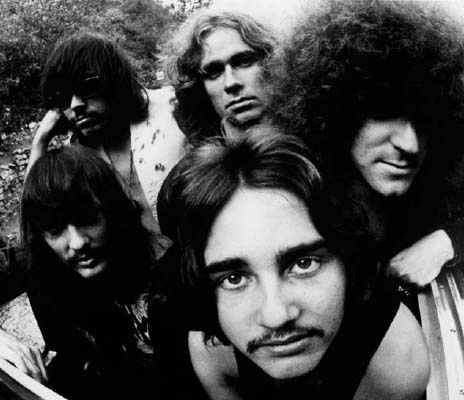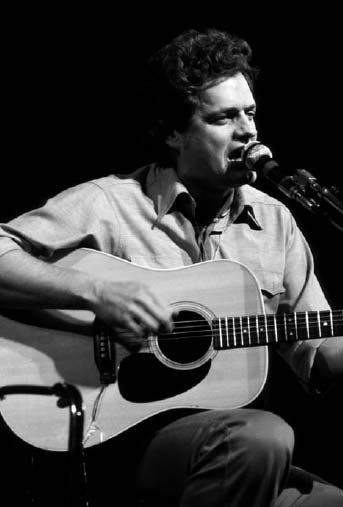The Encyclopedia of Dead Rock Stars (78 page)
Read The Encyclopedia of Dead Rock Stars Online
Authors: Jeremy Simmonds

Steppenwolf weren’t really a ‘heavy metal’ band, but may well have coined the expression in their best-known song. The band – John Kay (Joachim Fritz Krauledat, vocals), Goldy McJohn (keys), Jerry Edmonton (percussion) – all ex-Toronto folk-rock band Sparrow – Michael Monarch (guitar) and Rushton Moreve (bass) – were blues-based, though their seminal debut album paved the way for much-harder-edged music to follow. A classic of its era,
Steppenwolf
(1968) was recorded in just four days and was the parent album to revved-up biker anthem ‘Born to be Wild’. Its follow-up single, the psychedelia-drenched ‘Magic Carpet Ride’ emerged from a swiftly released second album. Both singles were million-sellers Stateside during the latter half of 1968, and Moreve became an important figure in the early (most successful) days of Steppenwolf. Indeed, he co-wrote with Kay most of the first two albums, The ‘Wolf gaining deserved recognition for their thoughtful lyrics and, for the time, unusual values (they were vehemently anti-drug). The pair borrowed heavily from underground literature – the band’s name itself came from Hermann Hesse’s mystical novel.

Steppenwolf: Should’ve stuck with bikes
Surprisingly, Moreve quit the band to return to session work after album number two, and was replaced by another former Sparrow-ite, Nick St Nicholas: over the years some forty-odd musicians came and went in Steppenwolf’s history. In July 1981, Moreve jumped into his car, got his motor runnin’ and headed out on the highway – and was killed in a headon collision in Sun Valley, California. Oddly, drummer Edmonton died in almost identical circumstances twelve years on ( November 1993).
November 1993).
See also
Andrew Chapin ( December 1985); Kent Henry (
December 1985); Kent Henry ( March 2009)
March 2009)
Saturday 11
Hubert Johnson
(Detroit, Michigan, 14 January 1941)
The Contours

Whether the phenomenal vocal ability of his cousin Jackie Wilson had anything to do with the depression Hubert Johnson was to feel in the latter part of his life remains unknown, but it was Wilson nonetheless who introduced The Contours to Motown head Berry Gordy – the supremo initially rejected the vocal five-piece. Two years on, a refreshed version of the band, including baritone Johnson, signed with the Motown head’s own Gordy imprint, and gave the label a first million-selling record with ‘Do You Love Me?’ (1962); the song – originally intended for The Temptations – was a UK number one for Brian Poole & The Tremeloes the following year. Although further successes did not arrive so effortlessly, The Contours were always a hit on the R & B charts and in Britain’s Northern soul casinos. But by the mid sixties Motown had lost interest in a band that didn’t fit their smooth house style.
Johnson – who’d resigned from the band in 1964 – put a bullet through his head in mysterious circumstances at his Detroit home seventeen years later.
‘Being a rock star is pointless. It’s garbage. It’s the most self-indulgent thing I can think of.’
Harry Chapin

Harry Chapin: More verity than balderdash
Thursday 16
Harry Chapin
(Greenwich Village, New York, 7 December 1942)

At the start of the seventies, there were as many musicians mourning the end of peace as there were others celebrating the start of noise. And there were those who just wanted to share a story or two: as hard-bitten as he was ‘artsy’, Harry Chapin was such a performer, eschewing the day’s musical trends more through his very nature rather than by intention. Chapin was the son of Jim Chapin, a noted jazz drummer who, as well as heading his own sextet, had been a regular player alongside Woody Herman and Tommy Dorsey during the forties. As a teenager, Chapin Jr sang with a local boys’ choir (with his friend Robert Lamm, later of the band Chicago) after his family moved to Brooklyn Heights. With two more musical brothers in the family, the Chapins put together an onoff group which eventually recorded an album,
Chapin Music
(1966). While studying philosophy at Cornell University, Chapin had developed an interest in folk music so powerful that it caused him to drop his studies. After some years spent making film documentaries (one of which,
Legendary Champions,
was Oscarnominated in 1969), Chapin returned to music and to the Village – the place of his birth – where troubadours were making waves. Chapin’s clever strategy of shunning the ‘paid gig’ roundabout and hiring himself a residency with his new band at the Village Gate – a venue frequented by industry types – was to pay off. Signed to the folk-loving Elektra label, Chapin scored a surprise US hit with ‘Taxi’ (1972), a song that blueprinted his distinctive style of emotive, ‘real’ tales of life’s ironies, disappointments and occasional joys. 1974 saw a commercial peak for Harry Chapin: the heavily sentimental ‘WOLD’ – a song about a DJ estranged from his family – returned him to the US (and UK) singles Top Forty, before ‘Cat’s in the Cradle’ gave him a US number one in December. This remarkably astute record – dealing with the selfishness of a career-obsessed father – has been a hit for many artists since. (Taking this success with a pinch of salt, Chapin’s comment was: ‘I suspect wives are buying it as zingers for their husbands.’) ‘I Wanna Learn a Love Song’ (1974) recounted the preface to Chapin’s own marriage and adoption of his wife’s three children. (He was nothing if not a magnanimous individual: of the 200-plus concerts Chapin played a year, at least half were benefits or charity events.) Parent album
Verities and Balderdash
went gold in the USA, though Chapin wasn’t to repeat the success; his only further hit was 1980’s ‘Sequel’ (which was indeed just that, to his first chart entry).
Despite the commercial downturn, Harry Chapin was still a massive live draw, and, on the evening of 16 July 1981, had a hotly anticipated free show to attend at the Lakeside Theater, Eisenhower Park. Leaving his Huntington Bay home, Chapin was driving his 1975 VW Rabbit along the Long Island Expressway when he unexpectedly changed lanes and began to slow dramatically from a cruising speed of around 65 mph; his emergency lights were flashing, suggesting that the driver was experiencing difficulties – he had possibly suffered a heart attack. Hitting another vehicle side-on, Chapin swerved again, this time into the path of a long-bed truck unable to adjust its own speed in time to avoid collision. Chapin’s VW was hit full-on, the fuel tank rupturing and bursting into flames as the car crumpled under the impact. The truck driver and another motorist managed to pull the badly injured singer clear but doctors working for half an hour at the Nassau County Medical Center were unable to save him. Thousands of fans learned the news as they awaited him at the venue.